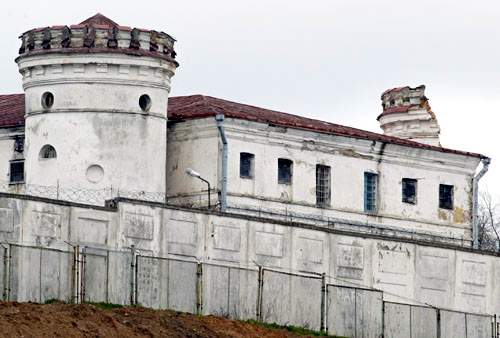Why did arrestee die in Minsk pre-trial prison’s hospital?
As part of the monitoring of the penitentiary system carried out by the
Human Rights Center "Viasna", human rights defenders keep receiving
letters in which prison inmates provide specific evidence of human rights
violations against people in custody and serving sentences, including allegations
of torture, and other evidence of inhumane treatment to prisoners.
In one of the recent
letters a prisoner who is now serving his sentence in a penal colony reports
evidence of the tragic events that took place in the afternoon of June 11, 2010 in the pre-trial prison
in Valadarski Street
in Minsk.
The following events
took place in cell No. 30 located in the prison hospital for defendants and arrestees
who are suspected of having tuberculosis. Opposite it is cell No. 27 for
patients with mental disorders. Both cells are equipped with ventilation
windows 10-20
centimeters high through which one can see part of the corridor
in front of the cells.
Then the prisoner says:
"At the time I was
in cell number 30. I heard loud shouts one of the patients in cell number 27,
which attracted the attention of all of our inmates. Although, it should be
noted, such cries can often be heard from the cell. Then there appeared a
controller on duty at the hospital and medical staff. However, making sure that
there was no violence used by other inmates against the patient, they requested
that the patient stopped shouting and calmed down, otherwise the rest of the
controllers would be called for. The duty inspector also demanded from other patients
that they "influenced" the loudmouth. After that, it was quiet for a
while. But at about 5 p.m. screaming resumed, and it became even more violent.
I watched the events together
with other inmates through the ventilation window. Several inspectors
re-entered the cell and after some minutes of fuss started "calming down"
the patient with rubber truncheons. At the same time we heard loud laughter,
which testified that the supervisors enjoyed battering the patient. Finally,
the patient was knocked down, tied up and tied to the bed. He screamed and
tried to free himself. For this he was beaten again. As a result, the patient grew
silent, and the inspectors left, closing the door of the cell.
It was almost time for evening
change of controllers’ shift, which takes place at 6 p.m.
After the shift change, we
heard someone rattling at the door from inside of cell No. 27 and asking for prison
staff to come. A controller named Nastya appeared, who was told that the
patient had stopped breathing. Hearing the complaints the inspector left, and
some 40 minutes later we heard persistent knocking again. The knocking was growing
louder and louder. The controller reappeared, and the patients told her that their
cellmate needed urgent help, because he had shown no signs of life for almost
an hour. The controller called for help. Sasha (paramedic on duty) came (the
name can not be real), together with the building head and several supervisors.
They opened the cell and untying the patient dragged him into the hallway. There
the doctor began to massage his heart. After the doctor ran to the treatment
room and returned indignant that there was no adrenaline there... the building
head then went to the phone and saying that he was going to call for an
ambulance phoned checkpoint No. 1. He then asked the paramedic what to report.
The answer was: "Tell them he has stopped breathing."
We, in our cell, heard
the conversation of the controllers with the building head who named the patient
as Semianovich, and one of those who an hour before beat him - Babko. Finally, the
inspectors noticed that we were overhearing them and closed the ventilation
window of our cell. We did not see anything else, but heard through the door
that the patient was dead..."
Commenting another
evidence of criminal inaction by the staff of prison No. 1 in Minsk,
which resulted in the death of a prisoner, expert of the Human Rights
Center "Viasna"
Pavel Sapelka notes the following:
"I have known for a
long time that life and health are not the highest values in prison. Pre-trial
detention centers, which contain, as a rule, the persons who have not been
found guilty of a crime are not an exception to the rule: the staff of these
institutions have already passed their guilty "verdict" on the convicts...
Isolated cases of abuse of prisoners have become widely known, and there were
several reasons for that. First, the prison system has discouraged prisoners from
reporting and providing evidence in cases where they witnessed the abuse by
prison staff.
Second, the authorities
entrusted with the duty to address the reported cases of this kind are rather obsessed
with their clean uniform than the execution of the law.
Third, the lack of
public control over places of detention allows for the concealment of what may
become the object of attention of the prisoners’ relatives, lawyers and human
rights defenders. Even in cases where the crime is addressed by the court, as
it was after the death of one of the prisoners in the jail of Babruisk, the court’s
assessment because of its softness does not match the gravity of the crime
committed by the prison officials."


















